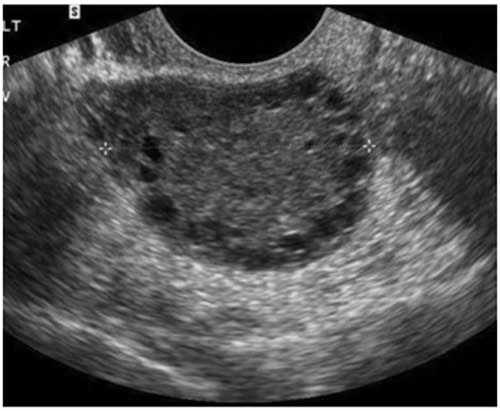What is PCOS?
Polycystic ovary syndrome is a common endocrine, metabolic and reproductive disorder that affects 5-10% of women in reproductive age group. PCOS is a collection of problems that are found together and not all women with PCOS have all the same symptoms.
To be diagnosed with PCOS, women usually have 2 of the 3 possible issues:
-
- chronic lack of ovulation (anovulation – no egg release) presenting as irregular menses
- chronic high testosterone (male hormone) levels (hyperandrogenism) causing excess hair growth, acne, and
- ovaries that have multiple (poly) fluid-filled sacs(cysts) on ultrasonography.

What causes PCOS?
The cause of polycystic ovary syndrome (PCOS) been not completely understood. It is believed that abnormal levels of the pituitary hormone luteinizing hormone (LH) and high levels of male hormones (androgens) interfere with the normal function of the ovaries. Also, women with PCOS have increased resistance to insulin hormoneand high body levels of insulin.
- What are the presenting features of PCOS?
Women with PCOS present with a spectrum of symptoms, like
| Menstrual Irregularities &Infertility | Excess of male hormone
(Androgen excess) |
Other hormonal abnormalities |
| Irregular, scanty menses (Oligomenorrhea) | Excess body hair growth (Hirsutism) | Insulin resistance & Type 2 Diabetes mellitus |
| Absent menses (Amenorrhea) | Acne | AcanthosisNigricans
(Thick, dark skin in body folds) |
| Irregular, prolonged and excess menses (Menometrorrhagia) | Hair loss (Alopecia) | Weight gain/ Obesity |
| Sub-fertility | Abnormal lipid levels (Dyslipidemia) | |
| Pregnancy loss |

Women with PCOS may present with various psychosocial problems such as anxiety, depression, low self-esteem, reduced qualityof life,andnegativebodyimage
How is PCOS diagnosed?
Due to its varied presentations, PCOS is diagnosed by identifying the evaluating the different problems using a combination of history, physical examination, ultrasonography and blood tests. Commonly, women may complain of irregular or missed menstrual periods or a long time between periods. They may also be overweight, have increased hair growth (hirsutism), acne, or may be unable to get pregnant. On ultrasonography, the ovaries would be enlarged with many small cysts. Blood tests may show high blood sugar, high cholesterol levels, or high levels of male hormones.

What long-term risks do women have with PCOS?
The most significant risk, especially in women of reproductive age group, is that of not ovulating regularly. When ovulation doesn’t happen, the regular hormonal cycle is interrupted which causes the lining of the uterus to be exposed constantly to estrogen. This causesthe lining (endometrium) to become too thick and cause abnormal bleeding. If left uncorrected,it also may lead to uterine cancer or pre-cancerous changes. The lack of regular ovulation can also make it difficult to get pregnant.
Metabolic syndrome is common in women with PCOS. Symptoms include excess weight gain especially around the abdominal area, elevated cholesterol levels, high blood pressure, and insulin resistance/diabetes. Each of these symptoms increases the risk of heart disease. Obesity is common in women with PCOS. Sleep apnea, a sleep disorder that causes people to briefly stop breathing while they sleep is also a part of the symptom complex of PCOS.
| LONG-TERM RISKS OF PCOS |
| Diabetes mellitus |
| Endometrial cancer |
| Cardiovascular disease |
| Sleep Apnea |
| Non-alcoholic fatty liver disease |
How is infertility in women with PCOS treated?
If a woman is overweight, losing weight can help improve ovulation patterns and fertility. Thus dietary modification and exercise form the first line of treatment. Insulin-sensitizing medicines such as metformin can help the body use insulin more effectively to improve ovulation. This may also lower the risk of developing diabetes or metabolic syndrome.
One way to treat infertility is to cause ovulation using medicineseither orally as pills or injections to stimulate the growth of egg and their release. Women with PCOS must be watched very carefully when these medicines are used to make sure that they are not responding too much. In vitro fertilization (IVF) may help women with PCOS get pregnant if other treatments do not work.
Is there a role for surgery?
There is a role for laparoscopic ovarian drilling especially in women who desire fertility and are not responding to medicines given for egg development. Lap ovarian drilling destroys the male hormone-producing ovarian tissue. This helps to regularise the hormonal cycle and restore the ovarian environment for normal egg production and release.
How is PCOS treated in women not trying to get pregnant?
When fertility is not the goal, taking hormone medication usually helps to correct PCOS symptoms. Oral contraceptive pills (the pill) can reduce the extra hair growth, acne and also make menstrual periods more regular, prevent pregnancy and uterine cancer.
Another method to treat menstrual irregularity is to take a hormone called progestin for 10 to 14 days every one to three months. This will induce a period in almost all women with PCOS, but it does not help with the cosmetic concerns (hirsutism and acne) and does not prevent pregnancy. It does reduce the risk of uterine cancer.
Metformin can help lower the risk of developing diabetes or metabolic syndrome. Excess hair and acne can be treated with medicines that lower male hormones. Excess hair can also be removed using electrolysis and laser treatment. Losing weight lowers the risk of diabetes and androgen levels in many women with PCOS.
Treatment should be tailored to each woman’s needs, symptoms, particular situation and may change over time which is bestplanned with your treating doctor. Have a healthy life!
Dr Sumina Reddy M.
Consultant Gynaecologist, Laparoscopic Surgeon& Fertility Specialist
drsumina@gmail.com | +91- 910091 7152

